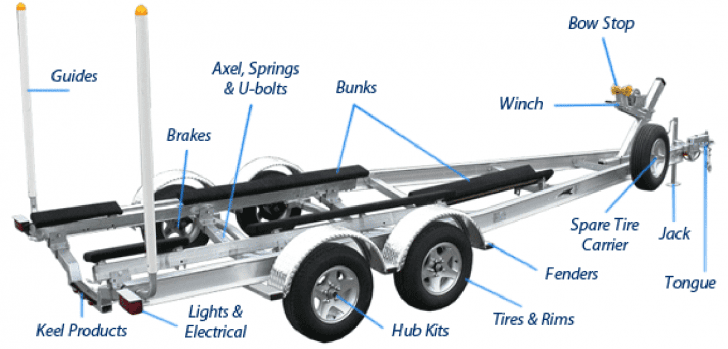I’ve found over the years that boat trailers really get no respect or care, and they often create misery and heartache as a result.
Buyers spend a lot of time trying to find the right boat, but very little time understanding differences in trailers and their options or the importance of properly maintaining them.
One of the most obvious is the question of painted, galvanized and aluminum trailers.
Painted steel trailers will not be able to withstand a salt water environment and will rust out quickly. Galvanized trailers last much better in a salt water environment. However, over time, especially if not rinsed properly, galvanizing can rust.
Aluminum trailers are lighter weight and are the ultimate choice for salt water use. Just remember, due to strength, even aluminum trailers have steel fasteners, tongues, winch posts, axles, springs and other steel components.
These parts of the trailer are still susceptible to salt water corrosion and need to be rinsed regularly.
Once corrosion sets in, the steel portions will become eaten out, often from within, creating a very dangerous situation. Most people have either seen or experienced a broken frame, axle, hub or trailer tongue.
Sometimes the failure happens at the landing when reloading, but if the critical failure happens while on the highway, it is dangerous for you and everyone on the road around you.
At Duncan’s Boats, we recommend that galvanized and aluminum trailers be rinsed thoroughly after use in salt water, paying special attention to axles, brakes, bunk brackets and all other steel components.
To mitigate the hassles somewhat, consider a custom aluminum trailer with aluminum welded bunk brackets, aluminum wheels, torsion axles (replaces leaf springs) and stainless steel fasteners.
You still need to rinse the axle, brakes and tongue, but the biggest culprits to corrosion will be improved.
Also, you should inspect your trailer carefully or have it serviced annually.
It is easier to inspect at the landing while the boat is in the water. Many components like the hubs and winch require grease. Brake systems should be checked. Winch ropes or straps should be inspected.
Look for any signs of rust. Check for proper tire pressure and look for signs of cracking in the sidewalls.
Finally, be sure that the trailer is loaded properly against the bow stop and secured with transom straps, even if the trailer has side guides.
Bottom line, don’t neglect your trailer. Your boat is a major investment. Too many times we’ve seen neglected trailers cause a missed outing, traffic accidents, extra towing bills and actual damage to the boat.
If you would like specific information about buying or taking care of your boat trailer, don’t hesitate to contact us at Duncan’s Boats.
Jim Duncan / Duncan’s Boats
www.duncansboats.com
843-744-2628
You may also enjoy reading Which Is Better Stern Drive Or Outboard?



